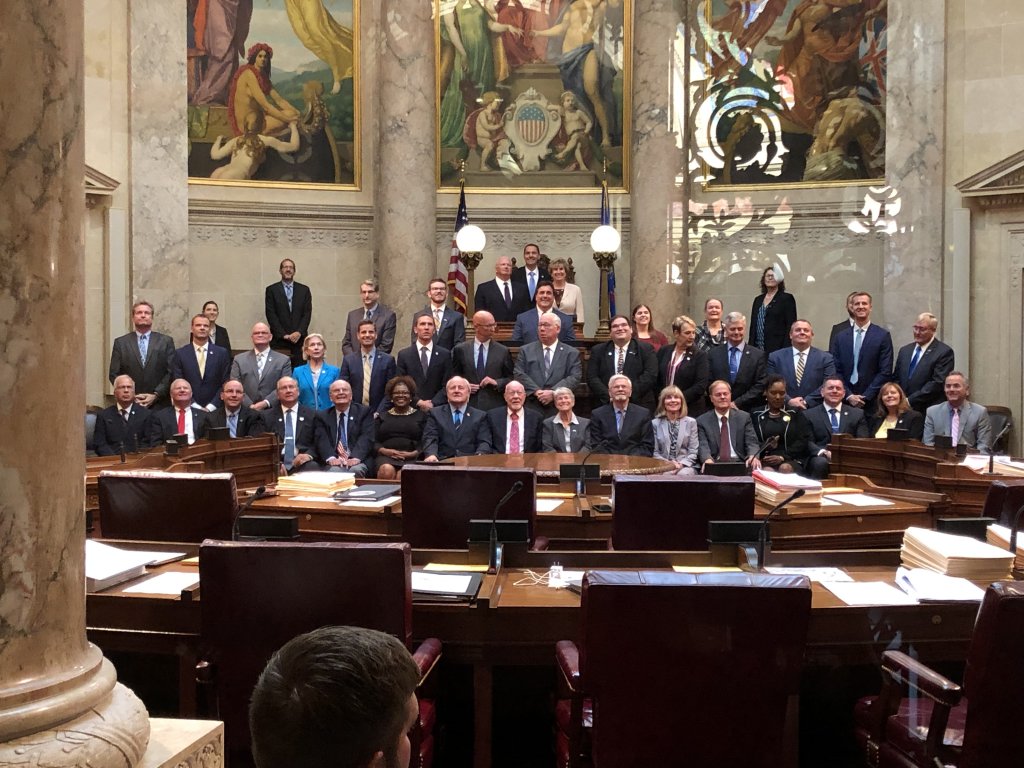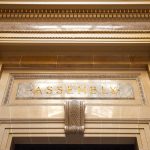Hot Debate, Limited Action by Senate
Limited bills on homeless, clean water passed, nothing on dark stores tax loophole.

Members of State Senate. Photo by Melanie Conklin/Wisconsin Examiner.
There was a running pattern to the state Senate’s first floor session of the year on Tuesday.
Time after time, a bill would come up that narrowly addressed an ongoing issue — one for which more sweeping legislation was already further back in the legislative pipeline.
Time after time, Senate Democrats would offer an amendment to marry the broader legislation to the bill that was on the floor. Addressing the subject more aggressively, they would tell their Republican colleagues, would have a greater impact.
After impassioned debate that never changed minds on either side, the amendment would fail along party lines, and the original, more limited legislation would pass, often unanimously.
Following that script, the Senate on Tuesday:
- Passed SB-310, regulating firefighting foam containing PFAS substances. Left behind: a broader bill directing the state Department of Natural Resources to develop broader and tougher PFAS regulations.
- Passed AB-119, appropriating $500,000 a year for grants to homeless shelters. Bypassed: a half-dozen other bills addressing homelessness that had already passed the state Assembly.
- Passed SB-96, to let taxpayers claiming their tax assessments were excessive go straight to court — instead of first filing a claim with the local taxing district. Sidestepped: action to rein in the so-called “dark stores loophole” that retailers have been using to cut property taxes around the state, leaving some local municipalities with gaping holes in their budgets.
- Passed SB-437, granting a single school district special relief from a state law that throttles revenues in school districts where taxpayers have rejected proposals to raise revenues to cover operating costs. Rejected: a Democratic attempt to spread that same relief to more schools.
Of those, the first to come up was the bill that would let taxpayers complaining about their assessments go straight to court, bypassing the taxing body. The debate over that measure gave a preview of what lay ahead.

Janis Ringhand. Photo from the State of Wisconsin Blue Book 2015-16.
When the bill came up, Sen. Janis Ringhand (D-Evansville) called attention to the Legislature’s continued failure to act on the so-called “dark store loophole.”
That’s what critics are calling the court rulings that have enabled big box retailers especially to get their property tax assessments — and thus their tax bills — slashed, on the grounds that the assessed value of operating stores should be compared to shuttered stores of similar size, without regard to the revenues that functioning stores pull in.
The bill, Ringhand and other Senate Democrats told their colleagues, was a chance to shut that loophole down.
“It’s very clear that businesses do not want to pay their fare share,” said Sen. Chris Larson (D-Milwaukee).
By not addressing the loophole, “you are raising property taxes for people that can’t afford it,” Sen. Janet Bewley (D-Delta) told the Republican Senate majority. “How can you possibly explain that you’re going to cut business’s taxes and raise the taxes on homeowners in their communities?”
Democrats presented a substitute amendment to the bill, adding language to explicitly close the dark store loophole. It failed on a party-line, 19-14 vote. The bill itself passed 25-8, with Larson, Bewley and Ringhand among the dissenters.
PFAS legislation
The firefighting foam legislation is a Republican-authored bill aimed at one source of the concern over perfluoroalkyl and polyfluoroalkyl substances, a group of chemicals found in thousands of everyday household materials.
The state’s largest known PFAS contamination incident, according to Wisconsin Department of Natural Resources officials, has turned up in the communities of Marinette and Peshtigo and has been blamed on the former Tyco Industries firefighter foam manufacturing and testing facilities there, now part of Johnson Controls International Inc. The DNR has designated Johnson Controls as a responsible party in the pollution and is pressing the company to undertake an extensive cleanup project there.
PFAS is not regulated by the federal Environmental Protection Agency, because they mostly predate the EPA’s founding, when a lot of chemicals already in use were exempted from regulation.
But in response to rising concern about PFAS contamination, not only in Marinette but also at sites in Madison, Rhinelander, and elsewhere, Sen. Dave Hansen (D-Green Bay) and colleagues introduced SB-302, which supporters have nicknamed the CLEAR Act. Its Assembly version is AB-321.
Both of those bills have been bottled up in committee since last summer, however, and the Republican committee chairs have so far declined to set public hearings.
That has left the firefighting foam bill, SB-310. It also has an Assembly version, AB-323, that cleared committee last month and was to be taken up by the Assembly on Tuesday.
In Tuesday’s Senate floor session, Democrats citing the inaction on the CLEAR Act legislation tried to insert its provisions into the firefighting foam bill through a substitute amendment.
“We need to do more” than the firefighting foam bill does, said Sen. Mark Miller (D-Madison).
“This is the next big pollution problem without a doubt,” said Hansen, and the CLEAR Act would offer a “comprehensive package” to regulate the substances. “We’ve got to do something now. This is serious, because people are getting sick.”
Sen. Robert Cowles (R-Green Bay), author of the Senate firefighting foam bill, said it was “never meant to be the only bill” on the subject and urged lawmakers to simply focus on passing it for now.
But Hansen reiterated the urgency of passing a broader bill: “You can’t wait until the next [legislative] session or the session after that,” he said.
When the vote on that amendment came, however, senators voted on party lines, with all 19 Republicans voting to reject it while all 14 Democrats voted for it.
The Senate then passed the firefighter foam bill on a voice vote, with a handful of dissenters, and sent the bill over to the Assembly. There, a similar Democratic maneuver to insert the CLEAR Act language was also rejected before the Senate bill was passed while the Assembly version was tabled. The legislation now goes to Gov. Tony Evers.
School revenue freeze exemption
The school revenue freeze exemption bill relates to a state law that freezes the revenue ceiling for school districts where voters have rejected a referendum to exceed the revenue limit for operating costs.
For the 2019-20 school years, school districts’ revenue ceiling is $9,700. But the current revenue ceiling law says that, for districts where a referendum to exceed their revenue ceiling in the last three years has been rejected, the revenue ceiling is frozen to the amount it was in the year when that referendum defeat took place.
SB-437 would create an exception — and only one school district in the state would benefit.
A press release issued Jan. 13 by Sen. Patty Schachtner (D-Somerset) jointly with Bewley points out that the language applies only to the Freedom School District in Outagamie County. Meanwhile, the revenue freeze language penalizes three rural northwestern Wisconsin school districts, they stated: Cameron, Maple, and Osceola.
With that in mind, Democrats offered another substitute amendment: Instead of tailoring the language to waive the ceiling freeze for a single district, it would eliminate the ceiling freeze altogether. The amendment failed on another 19-14 party-line vote.
Homeless bills
The Senate replayed the scenario one more time later in the afternoon when taking up AB-119. The bill calls for $500,000 in grants for agencies serving the homeless in each of the two years of the state budget biennium.
Voting 19-14 along party lines, senators approved an amendment authored by Sen. Steve Nass (R-LaGrange) requiring the Wisconsin Housing and Economic Development Authority (WHEDA) to pay out $1 million of its surplus fund to the general fund, in essence funding the bill’s appropriation.
Democrats then offered an amendment of their own.
The grants bill was one of a package of seven bills aimed at addressing homelessness that passed the Assembly in June and have since been stalled. The others are AB-120, AB-121, AB-122, AB-123, AB-124, and AB-125.
Those bills, totaling more than $5 million, would provide a range of services and assistance for homeless families, from housing navigation and case management to targeted job training and subsidies to defray housing costs.
Only the bill making grants for agencies has made it out of committee in the Senate, however. So once again, Democratic senators turned to the substitute amendment process, this time writing the language of the other bills into the grants bill.
“We can do more because there’s more that needs to be done,” said Sen. Minority Leader Jennifer Shilling (D-La Crosse).
Republicans agreed that the bill they were voting on didn’t go far enough — but then said the homelessness problem was so complicated that it needed more time to consider how to respond.
“This is not only a money issue, this is a relationships issue,” said Sen. Dale Kooyenga (R-Brookfield). He went on to cast a very wide net in assessing the causes of homelessness, listing everything from real estate regulations to drug addiction to education to occupational licensing as relevant — and therefore as reasons to put off the broader discussion and limit the action Tuesday to the shelter grants bill.
“Homelessness is not a choice. It’s not a lifestyle,” retorted Sen. Jon Erpenbach (D-West Point). Later in the debate, he noted: “Nobody objected to this over at the Assembly. Nobody!”
Once again, however, Republicans defeated the Democrats’ attempt to broaden the bill, blocking it on a party-line vote of 17-14. The original bill, with the Nass amendment, then passed 32-0.
Because it had been amended in the Senate, the bill returned to the Assembly, which late in the day concurred in the Senate version and sent it to the governor.
Reprinted with permission of Wisconsin Examiner.
More about the Dark Store Loophole
- Wisconsin Supreme Court ‘dark store’ decision a huge win for state’s taxpayers, municipalities - Ald. Scott Spiker - Feb 23rd, 2023
- Wisconsin Supreme Court Rules Against “Dark Store Loophole” - Henry Leonard - Feb 17th, 2023
- Campaign Cash: Real Estate Interests Back GOP Bill - Wisconsin Democracy Campaign - Nov 18th, 2021
- Hot Debate, Limited Action by Senate - Erik Gunn - Jan 22nd, 2020
- Senate Democrats Offer 2020 Agenda - Laurel White - Dec 24th, 2019
- Dark Store Loophole Continues to Shift Property Tax Burden to Homeowners - State Rep. Gordon Hintz - Dec 19th, 2019
- Examining the Dark-Store Loophole - Melanie Conklin - Aug 7th, 2019
- Senate GOP Refuse to Close the “Dark Store” Loophole - State Sen. Jennifer Shilling - May 15th, 2019
- Senate Republicans unanimously reject vote on Dark Store fix - State Sen. Janis Ringhand - May 15th, 2019
- The State of Politics: Can Any ”Dark Store” Reform Get Passed? - Steven Walters - Apr 22nd, 2019
Read more about Dark Store Loophole here





















